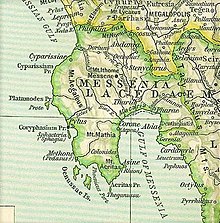Messenia (ancient region)
|
Messinia Μεσσηνία |
|
|---|---|
| Region of Ancient Greece | |

Burial chamber, Pylos
|
|

Map of ancient Messenia
|
|
| Location | Peloponesse |
| Major cities | Messene |
| Dialects | Doric |
Messenia or Messinia (Greek: Μεσσηνία) was an ancient district of the southwestern Peloponnese more or less overlapping the modern Messenia region of Greece. To the north it had a border with Elis along the Neda river. From there the border with Arcadia ran along the tops of Mount Elaeum and Mount Nomia and then through foothills of Taygetus. The eastern border with Laconia went along the Taygetus ridge up to the Koskaraka river, and then along that river to the sea, near the city of Abia.
Ancient Messenia descended continuously without change of name and with little change of territory to the modern Regional Unit of Greece of the same name. The population remained Greek although there was some immigration of Slavs, Albanians and Turks.
The earliest inhabitants of Messenia were thought by the Greeks of the Classical period to have been 'Pelasgians', as in other regions of Greece. Supposedly, the Hellenic tribes had then arrived in Greece, and Messenia was settled by Aeolian Greeks. The Homeric poems suggest that during the Mycenaean period, eastern Messenia was under the rule of Menelaus of Sparta, while the western coast is under Neleus of Pylos; after Menelaus’s death Neleus pushed the frontier as far as Taygetus. The Mycenaean city of Pylos has been identified with the modern site of Ano Englianos, in western Messenia. Excavations at Pylos and Nichoria have revealed for Messenia's late Bronze Age (14th century BC) a bureaucratic, agricultural kingdom ruled by the wanax at Pylos. The Messenians spoke Mycenaean Greek, and worshipped the Greek gods at local shrines like that at Sphagianes. During the legendary Dorian invasion of the Peloponnese during the Greek Dark ages, Messenia was supposedly invaded by Dorians under Cresphontes, arriving from Arcadia. They took as their capital Stenyclarus in the northern plain, and then extended, first their suzerainty, and then their rule over the whole district.
...
Wikipedia
